Parking sucks. Just ask the average American driver who spent a combined 17 hours last year looking for an open spot. But Mexico City thinks parking lots — and how they gobble up space that could go toward desperately needing affordable housing — are a hell of a lot worse.
This month, the Mexican capital reversed its previous rule requiring developers to build a minimum number of parking lots when constructing new offices or apartments. In its place, the city introduced some radical new parking maximums, which will now limit the amount of space a developer can dedicate to cars.
While American cities have been reluctant to hit the brakes on their own parking policies, Mexico City’s latest act could set an important example. The policy change is expected to reduce congestion, road wear, and pollution. Most importantly, it may free up the space needed to make affordable housing a reality.
Mexico City from the sky
The United States is currently home to somewhere in the ballpark of 500 million parking spots — and, thanks to outdated policies, more are still being built. Tech giant Apple was required by city ordinances to construct a whopping 11,000 parking spots for the 14,000 employees that will work at its $5 billion “Spaceship” headquarters in Cupertino, California. That’s a whopping 80 acres of prime Bay Area real estate eaten up by pavement.
If land were limitless, this wouldn’t be a problem, but land is scarce and affordable housing is even scarcer. Right now in the United States, there are only 21 affordable units for every 100 low-income families. In San Francisco, the problem is especially acute, with just 14.5 “naturally affordable” units for every 100 renters, according to an April 2017 report from the Urban Institute. While this problem has many roots, part of the crisis can be attributed to simple supply and demand. So long as the city just doesn’t have enough units for the number of people who want to live there, housing prices won’t dip. And, of course, new developments won’t be built if land isn’t available.
Fortunately, Mexico City shows solutions still abound. Before its U-turn last week, developers in Mexico City had to build at least one parking spot for every 30 square meters of floorspace, according to Streetsblog USA. Now, one spot for every 30 square meters will be the absolute max in Mexico City. And, thanks to new fines, developers will likely build a lot fewer, as those building more than 50 percent of the maximum will have to pay for the privilege. Though the new rule does require a new kind of parking spot be built, for bikes.
While it’s unclear how much space this will open up for other development in Mexico City, it won’t be small. And if existing parking lots start to be reclaimed for housing or parks, there’s no telling how Mexico City — or the world — will change.
